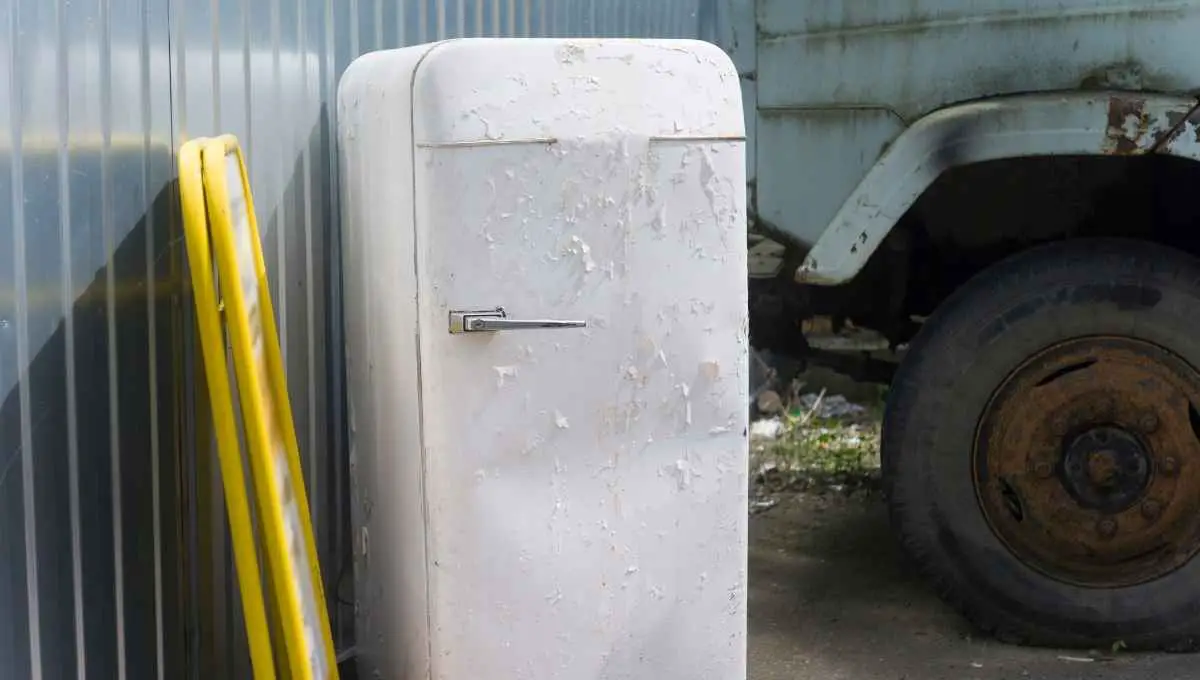Is It Illegal to Leave a Refrigerator Outside? (We Checked)

Sometimes we don’t have room to store an unused refrigerator inside or we want to have a refrigerator conveniently placed outside for easy access during the nicer months. Either way, you should first find out if it is illegal to leave a refrigerator outside before you do so.
It is illegal to leave an unused refrigerator outside, as this is often considered illegal dumping. You can be fined for this and charged with breaking public nuisance law. If however, the refrigerator is actively in use, you are legally allowed to leave a refrigerator outside.
However, there are many things to consider when leaving a refrigerator outside, whichever your reason for doing so. We will discuss everything you need to know so you don’t get into trouble with the law or damage your refrigerator.
This post contains affiliate links from Amazon and other stores. This means Yard Blogger may earn a commission if you make a purchase using any of our links. Please refer to our full affiliate disclosure policy for full details.
Here’s a Quick Pro Tip!
Leaving a refrigerator outside that is not being used is illegal and using an indoor refrigerator outdoors is not recommended.
So, purchasing an outdoor refrigerator is a great solution!
Here are some of our favorites from Amazon:
1. Zephyr Outdoor Refrigerator – Excellent option for storing beverages
2. Bull 13700 Series II – Highly rated with a sleek style
3. Blaze Outdoor Compact Refrigerator – Interior white LED light perfect for outdoor parties
When it is Illegal to Leave Your Refrigerator Outside
As we have mentioned, it is illegal to leave your refrigerator outside when it is not in use. Let’s discuss how this law came to be and why you should definitely abide by it.
Is It Illegal to Leave a Refrigerator Outside?
It is illegal to leave your refrigerator outside if you are planning to not use it. This law is in place mainly to protect children from playing in the refrigerator and accidentally getting stuck in it, which could lead to suffocation.
If you get caught with a refrigerator that is outside on your property, you may get charged with a public nuisance. To not get charged, you must have the fridge securely locked up preventing anyone from opening it.
Can I Abandon My Refrigerator Outside?
It is illegal to abandon your refrigerator outside. Refrigerators pose a risk to children who may want to play in them since they can accidentally get locked in the fridge and suffocate to death.
To prevent this, many states make it illegal to abandon a refrigerator outside. If you want to store a refrigerator outside, you must tie it up in a way that prevents anyone from opening it.
Keep in mind, you will likely get charged with illegal dumping if you just leave your fridge outside.
What Is the Fine for Abandoning a Refrigerator Outside?
If you abandon a fridge outside, you may get charged with both illegal dumping, which is the improper disposal of an appliance, and with public nuisance. The fines will depend on where you live.
For example, in New York City, you can get fined up to $18,000 for illegal dumping and spend up to one year in jail.
For a public nuisance charge, you can get fined anywhere from $500 to $1000 depending on the extent of the crime.
How Do You Dispose of a Refrigerator?
To properly dispose of a refrigerator, you should leave it on your curbside during a bulky item pickup day provided by your local waste management company. Or, you can donate the refrigerator.
If your refrigerator is still in working condition, you should consider donating it to a local charitable organization or thrift shop.
If your refrigerator is no longer working, then you should leave wait until your city is having a bulky item pick up, and then leave it on the curb during that time.
Check with your city’s pick-up schedule to find out if you need to schedule a special appointment to have the fridge picked up.
Can You Leave a Refrigerator Out For Garbage?
Appliances, including fridges, can be left out for garbage pick-up if your city has a bulky item pick-up option. Depending on where you live, you may have to schedule a special pick-up for your refrigerator.
It is crucial to check with your city’s bulky item pick-up schedule since they dictate when you can put the fridge out. If you put your fridge out too early, you can get fined with illegal dumping.
Thankfully, you are typically allowed to leave your fridge out 3-5 days before the pick-up day.
You might also enjoy our post on 25 Fun Outdoor Games For Large Groups to Enjoy
When it is Legal to Leave a Refrigerator Outside
Now that we have discussed when it is illegal to leave a refrigerator outside, let’s examine when it is legal. But, just because it is legal, doesn’t always make it okay.
We will tell you how to best go about using a refrigerator outdoors.
Is It Okay to Leave a Refrigerator Outside?
If you are planning to use your refrigerator that is outside, it is okay to leave it outside. It is only not okay to leave a refrigerator outside if you plan to not use it and don’t tie it up or remove the doors.
But, if your plan is to use the refrigerator outside then this is legal. However, you should consider buying an outdoor fridge instead of using your indoor fridge.
Indoor fridges are not built to withstand outdoor elements nor adjust their temperature as much as is needed when they are outside. You may end up damaging your fridge if you leave it outside.
What Is an Outdoor Fridge?
An outdoor fridge is designed to maintain its cold temperature during highly fluctuating temperatures that occur outside, compared to inside. Additionally, the electrical components of an outdoor fridge are weatherproofed.
An indoor fridge only has to deal with temperatures between 60 and 80 degrees Fahrenheit, whereas outdoor fridges sometimes have to deal with temperatures changing as much as 40 degrees overnight.
So, the outdoor fridge is specially insulated to be able to maintain its inside temperature while being exposed to an unstable environment.
What Is the Difference Between an Indoor and Outdoor Fridge?
The main difference between an indoor fridge and an outdoor fridge is that an outdoor refrigerator has the ability to maintain an interior temperature regardless of the fluctuating exterior temperature.
Outdoor refrigerators are also designed in a specific way to make them weatherproof. Indoor refrigerators placed outside can become a safety hazard because the electrical components are not protected.
Do You Need a Special Refrigerator for Outdoor Use?
If you choose to use a refrigerator for outdoor use, you should use a refrigerator that is designed for indoor/outdoor use. These refrigerators are designed to safely and effectively operate outdoors.
An indoor fridge is designed for use indoors where temperatures range from 60 to 80 degrees Fahrenheit. Any extreme temperatures inflicted on the indoor fridge can cause it to become overworked eventually ceasing to function at all.
You might also enjoy our post on Are Outdoor Outlets Safe in Rain?
Why Are Outdoor Fridges So Expensive?
Outdoors fridges are more expensive than indoor fridges because they require higher quality materials such as 304-grade stainless steel and waterproof components, plus extra insulation.
Thankfully, you get what you pay for when it comes to outdoor refrigerators.
An outdoor refrigerator, costing upwards of $800, will maintain its interior temperature of 34-50 degrees Fahrenheit even when the exterior temperature is a scorching 104 degrees Fahrenheit.
Do I Need to Protect My Outdoor Fridge From the Elements?
As we know, anything lasts longer when it is protected from the elements. Although an outdoor refrigerator is better equipped to withstand the elements than an indoor fridge, it is still beneficial to protect it to make the refrigerator last longer.
You should pick a spot outside that is sheltered and shaded, perhaps under an awning on the back deck or underneath a pergola.
Also, ensure there is proper airflow around the fridge and the fridge isn’t directly up against a wall.
Best Outdoor Refrigerator
The award for best outdoor refrigerator of 2022 goes to the Bull 13700 Series II Stainless Steel Outdoor Refrigerator. This refrigerator has glowing 5-star reviews on Amazon and for good reason.
The Bull 13700 Series II is built from 304 stainless steel that ensures durability and longevity, being able to withstand all seasons.
It is perfect to use in an outdoor kitchen or set up alone if you want an easy access place to store drinks.
Is an Outdoor Fridge Worth It?
An outdoor fridge is worth it depending on your needs. If you are looking for a fridge that you can keep out year-round to store drinks or snacks in, then an outdoor fridge will provide and last, making it worth your money.
Besides, if you use an indoor fridge outside, you’re only going to experience a higher electricity build since your fridge is going to have to work in overdrive.
Your fridge will also eventually break and will be a safety hazard.
Consequences of Leaving an Indoor Refrigerator Outside
As mentioned, outdoor refrigerators are an excellent – and almost only – option for when you want to use a refrigerator outdoors. But why? What is so bad about using an indoor refrigerator outdoors? Let us explain.
Can a Refrigerator Sit Outside in the Rain?
A little bit of rain may not damage a refrigerator but continuous exposure to heavy rain will eventually cause electrical damage and rust. You may even get an electrical shock if you touch a refrigerator that is wet.
Even outdoor refrigerators should not be exposed to continuous rain. Although they are designed to better withstand rain, you should still protect them from rain if you can.
Too much rain causes the electrical components to fry and the metal to rust.
Can You Leave a Refrigerator Outside in the Summer?
If you have an outdoor refrigerator, they are designed to maintain their interior temperature even when outdoor temperatures are 104 degrees Fahrenheit. However, an indoor fridge is not designed to do so.
An indoor fridge is only designed to work within exterior temperatures up to 80 degrees Fahrenheit.
If you live somewhere that gets hotter than this, your fridge will have to work extra hard eventually causing the fridge to break completely.
Can a Fridge Be Outside in the Winter?
Whether or not your fridge will be okay in the winter depends on where you live. If you live somewhere with extreme winter temperatures, such as -4 degrees Fahrenheit, it is not wise to leave your fridge outside.
The temperature control of a fridge can be tricked when the temperature falls below 40 degrees Fahrenheit. The fridge will think that it is cold enough and will stop functioning resulting in spoiled foods and drinks.
If the weather becomes extremely cold, the oil in the compressor can even freeze, making it too thick to circulate. When the fridge operates in this condition, the compressor can eventually burn out.
You might also enjoy our post on If You Can Deep Fry a Turkey Indoors
Can You Leave a Fridge Outside in the Winter Unplugged?
If you are leaving your fridge outside and unplugged, this is illegal, regardless of the season. You will be technically abandoning or storing your fridge outside which is a safety hazard to children.
Children are known to play in fridges that are left outside, either exploring or playing hide-and-seek. The fridge can lock on the children inside, causing them to become stuck and eventually lose access to oxygen, causing death.
For this reason, it is illegal to leave a fridge outside that is not in use. You will get charged with public nuisance if you do so.
Can Cold Weather Affect a Refrigerator?
If a refrigerator is operating in conditions below 40 degrees Fahrenheit, the compressor of the refrigerator can be tricked into thinking that the internal temperature is cool enough and will simply turn off.
However, this is not the case and the food will eventually spoil. Colder temperatures can cause the oil in the compressor to freeze, making it too thick to circulate.
The compressor will eventually burn out and stop functioning.
Can You Leave a Refrigerator in the Garage?
If you live in a relatively mild climate year-round and have a well-insulated garage, a refrigerator will function properly in the garage.
But, if your garage is not well insulated and you experience extreme temperatures, it is not recommended to leave your refrigerator in the garage.
You can leave your refrigerator in the garage during more mild temperatures and then bring it inside when the temperature gets extra hot or cold.
Can I Put a Refrigerator in My Garage That Gets Hot?
Refrigerator manufacturers do not recommend that you place your refrigerator anywhere that goes above 80 degrees Fahrenheit. This can cause your refrigerator to go into overdrive eventually ruining the fridge completely.
When your refrigerator is exposed to hot temperatures, it will be continually overcompensating to maintain the cold temperature inside.
Since the refrigerator will be working harder for a longer time, it will eventually die completely from overuse.
Can You Keep a Fridge in an Unheated Garage?
You can keep a fridge in an unheated garage if you live in an area that is mild and does not experience harsh temperatures, such as below 40 degrees Fahrenheit.
An indoor fridge is not built to be able to sustain these temperatures. A fridge is meant to maintain an indoor temperature of 40-60 degrees Fahrenheit.
When the exterior temperature is less than 40 degrees Fahrenheit, the compressor is tricked into thinking that the interior temperature is actually 40 degrees when in fact it is warmer.
This will cause your food to spoil and mold to grow on the food and possibly on the fridge.
You might also enjoy our post on If It is Illegal to Leave Furniture on the Street
Problems With Using Your Indoor Fridge Outside
Your indoor fridge is simply not designed to function in outdoor conditions causing it to lose its effectiveness more quickly, eventually leading to complete loss of function.
Indoor fridges are designed to work optimally in temperatures of 40-80 degrees. Anything lower can trick the fridge into thinking that the interior temperatures are where they should be when in fact they are much warmer.
On the other hand, higher temperatures can cause the fridge to go into overdrive trying to compensate for the increased temperatures.
This will eventually cause the fridge to stop functioning from overuse.
Tips for Successfully Keeping a Fridge Outside
Although it is not recommended to keep an indoor fridge outside, there are ways that you can protect the fridge from the elements making it last longer.
Follow these tips for keeping a fridge outside:
- Place the fridge somewhere protected from wind, sun, and rain
- Ensure there is adequate airflow around the fridge
- Regularly inspect and clean the fridge
- Bring the fridge indoors during extreme temperatures and conditions
- Clear the fridge of debris including leaves and twigs
Related Questions
How Long Can You Keep a Refrigerator Unplugged?
If you have food in your refrigerator, the refrigerator should only be unplugged for four days. Any longer can cause bacteria to grow which can be harmful to ingest.
The bacteria may also spread to the interior of the fridge.
If the refrigerator is empty, you can unplug it for months at a time as long as you turn off the ice maker, temperature control, and water supply. You should then clean your fridge thoroughly, dry it, and then leave the doors open.
This will prevent bacteria from growing while the fridge is turned off.
Final Thoughts
If you want to keep a refrigerator outside, your best option is to buy an outdoor refrigerator that is designed to withstand a wider range of temperatures.
Although they tend to be pricey, it will be worth not having to repair your damaged indoor fridge or having to replace it completely.






